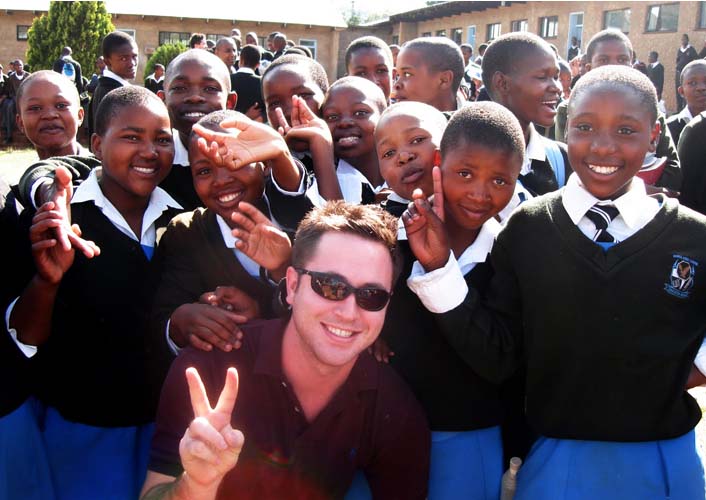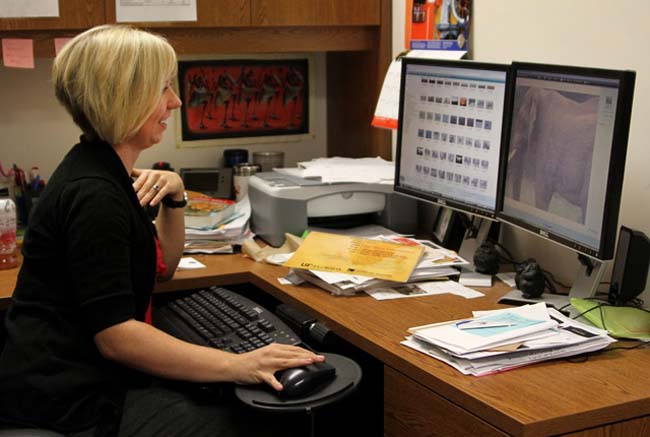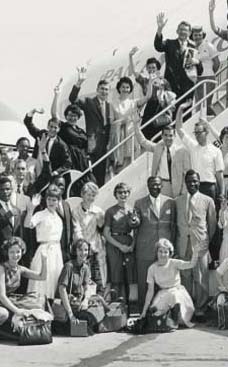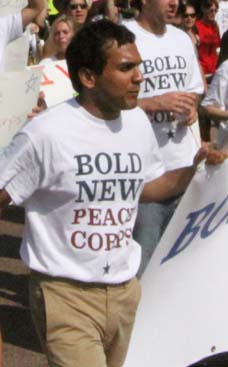2011.03.02: March 2, 2011: Peace Corps Recruiter remembers Thomas Maresco
Peace Corps Online:
Directory:
Lesotho:
Peace Corps Lesotho :
Peace Corps Lesotho: Newest Stories:
2010.09.04: Peace Corps Mourns the Loss of Volunteer Thomas Maresco :
2011.03.02: March 2, 2011: Peace Corps Recruiter remembers Thomas Maresco
Peace Corps Recruiter remembers Thomas Maresco

A Peace Corps representative from Washington, D.C., called the family and said they would have Maresco's body home in three days. On the fourth day, Maresco's dad, Thomas Maresco Sr., called and told them he was going to South Africa to bring home his son. "I'm convinced that if I didn't insist on going that he might still be there," Maresco Sr. said. It took two weeks for Maresco's body to reach Port St. Lucie, his hometown. Parts of the funeral can be seen on YouTube. Panikowski attended the funeral. She went because she felt like she had to say goodbye one last time. She went for closure and to say some words to the family. The family didn't want to be reminded of anything that represented the Peace Corps. They feel the whole recruiting process paints a picture of the Peace Corps that is not completely true. They feel Maresco wasn't prepared for some situations and that he wasn't given the proper training or knowledge of what faced him in a developing country. "They recruit your kids, like the Army or the Navy or the Marines," Maresco Sr. said. "I don't think they gave him the whole picture." Maresco Sr. equates the shortcomings of his son's training to sending a Marine to Afghanistan without a weapon or flak jacket. "They send these kids to these third world nations, where life doesn't mean anything," he said. Everything was too fresh. The family wouldn't speak to Panikowski, so she said her final goodbyes to Maresco and left the funeral. Panikowski says she feels like she has been living in two different time speeds this semester. Sometimes time flies; other times, it crawls. She sees a grief counselor. Still, she recruits. Since Maresco's death, she has helped 20 to 25 students through the nomination process. She thinks once the nominations are tallied she will have the most among college campuses. She still feels awful about what happened. "I'm very sorry that someone chose to take him away from everything he was doing, and I'm very sorry someone took him from everyone that should have known him," she said. But she thinks Maresco would want her to continue helping people, to continue doing her job, to continue living every day. But she doesn't believe she will ever be able to take Maresco's tack down.
Peace Corps Recruiter remembers Thomas Maresco
Recruiter still mourns death of UF Peace Corps Volunteer
Posted: Wednesday, March 2, 2011 11:39 pm
Recruiter still mourns death of UF Peace Corps Volunteer Derek Gilliam, Alligator Contributing Writer The Independent Florida Alligator | 2 comments
A map of the world with bits of paper stuck to it hangs in Amy Panikowski's office.
For Panikowski, the Peace Corps recruiter for UF, each bit of paper represents someone she recruited who is now serving as a Volunteer.
Entire regions disappear underneath the names of Volunteers. West Africa hides below the white strips bonded by sewing pins. Latin America's many countries vanish into a mess of small white slivers. Eastern Europe and South America also are dotted with pins and pieces of paper.
Most of the names stick to the map with a simple pin, but two names have tacks. One is a blue tack sticking through Malawi, representing Panikowski's service.
Then there's the silver tack piercing through Lesotho.
Small black letters typed out on the bit of paper read "Thomas Maresco, Science Teacher."
- - -

Caption: Amy Panikowski looks at the photos from her recent trip to South Africa in her UF office. Panikowski, the Peace Corps recruiter at UF, helped recruit Maresco. PhotoL Nicole Crisp
He would come to the globe talks Panikowski gave once a month. He would hear stories of past Peace Corps Volunteers: stories about seeing exotic locations, helping the less fortunate, making friendships that spanned oceans. The stories sounded great. He was always the first there and helped set up the room. She remembers him sitting in the back of the conference room on one of the tables and kicking his legs like a schoolboy. He was the last to leave if he didn't have work. He worked the night shift for a chemical company. While at work, he would scour the Internet for any Peace Corps blogs he could find. He had questions about what he read and regularly talked with Panikowski. They talked about what he could do to help. Where he wanted to go, where he could be sent, things he should bring with him and what he could expect. These conversations went on for two months before November 2008, when he was nominated to be a Volunteer. He graduated that year with a degree in biology from UF and would teach science in Lesotho. Medical school was a possibility once he returned. "I think in a lot of ways we are always looking for a Tom in our lives," she said. "But I think, in a way, he found me."
Panikowski says she is the best campus recruiter for the Peace Corps. She has said that for the past three years she has led all college recruiters in nominations.
After completing her undergraduate work at Mars Hill College in North Carolina, she was the only one from her class to volunteer for the Peace Corps.
Stationed in Malawi in 2001, Panikowski still misses Africa. She misses the people, the landscape and the sense of accomplishment that came with volunteer work.
Sent home early after coming down with malaria and having bad reactions to the medicine, she said she wishes she could have spent more time there.
After bouncing around between a couple jobs, she landed in Gainesville in 2005 and started recruiting for UF. The pay isn't great, but she doesn't do it for the money.
"I do it because they inspire me every time I see them, and I'm really proud to have them go and make a difference in another person's life," she said. "I think that's the best reward I can ever get."
Terry Keyzer said he never seriously thought about volunteering for the Peace Corps but sometimes would go to Panikowski's talks because Maresco went to them.
Keyzer and Maresco went to the same high school but didn't start hanging out until college. They brewed beer together and would go out and shoot pool at Gator City on Friday nights.
When Keyzer wrecked his motorcycle and had emergency surgery to remove his appendix, five people visited him in the hospital. Maresco was one of them, bringing Keyzer his favorite cigar and an issue of Maxim magazine.
Maresco always knew what to say, Keyzer said.
When he left, he left behind his fiancee, Maya; his dog, Coco; a host of friends; and his parents.
They expected him to come back. His dad had made plans for a November trip to Lesotho.
Maresco arrived in the small African country around November 2009. During training, his host mother gave him his Sesotho name, "Reitumetse" (Ray-Two-Metsey), which means "the one we believe in." They told Maresco he was a gift from God.
He finished training and was placed in the mountain village of Katse. He taught 12th-grade biology and 10th-grade math.
He skinned his first sheep. He watched a World Cup game in South Africa, cheering for the United States.
When he was missing people from back home, he would listen to songs that reminded him of his friends and family.
Maresco was doing something he believed was helping. The Peace Corps seemed like everything he could want.
On Sept. 3, 2010, Thomas Carmine Maresco Jr. was shot and killed in Lesotho's capital city of Maseru, one block away from the Peace Corps training facility.
He and a friend were walking together near the Maseru Sun Cabanas Hotel when they heard a noise in the bushes. A man with a gun confronted the two and shot Maresco in the chest. His friend ran into the hotel and the police were called.
Panikowski found out Sunday night when she was with her family celebrating Labor Day weekend. A friend texted her saying she was sorry to hear about the death of a UF Peace Corps Volunteer.
She ran to a computer and found out. She lost it.
She couldn't do anything for a week. She felt like she was in a daze. In some ways, she says she still is.
"The hardest thing I ever had to do was to accept that he was gone and he's not coming back," she said.
One of the names on her map was never going to come home.
A Peace Corps representative from Washington, D.C., called the family and said they would have Maresco's body home in three days. On the fourth day, Maresco's dad, Thomas Maresco Sr., called and told them he was going to South Africa to bring home his son.
"I'm convinced that if I didn't insist on going that he might still be there," Maresco Sr. said.
It took two weeks for Maresco's body to reach Port St. Lucie, his hometown. Parts of the funeral can be seen on YouTube.
Panikowski attended the funeral. She went because she felt like she had to say goodbye one last time. She went for closure and to say some words to the family.
The family didn't want to be reminded of anything that represented the Peace Corps.
They feel the whole recruiting process paints a picture of the Peace Corps that is not completely true. They feel Maresco wasn't prepared for some situations and that he wasn't given the proper training or knowledge of what faced him in a developing country.
"They recruit your kids, like the Army or the Navy or the Marines," Maresco Sr. said. "I don't think they gave him the whole picture."
Maresco Sr. equates the shortcomings of his son's training to sending a Marine to Afghanistan without a weapon or flak jacket.
"They send these kids to these third world nations, where life doesn't mean anything," he said.
Everything was too fresh. The family wouldn't speak to Panikowski, so she said her final goodbyes to Maresco and left the funeral.
Panikowski says she feels like she has been living in two different time speeds this semester. Sometimes time flies; other times, it crawls. She sees a grief counselor.
Still, she recruits. Since Maresco's death, she has helped 20 to 25 students through the nomination process. She thinks once the nominations are tallied she will have the most among college campuses.
She still feels awful about what happened.
"I'm very sorry that someone chose to take him away from everything he was doing, and I'm very sorry someone took him from everyone that should have known him," she said.
But she thinks Maresco would want her to continue helping people, to continue doing her job, to continue living every day.
But she doesn't believe she will ever be able to take Maresco's tack down.
Links to Related Topics (Tags):
Headlines: March, 2011; Peace Corps Lesotho; Directory of Lesotho RPCVs; Messages and Announcements for Lesotho RPCVs; Safety and Security of Volunteers; Crime; Fallen; Murder; Recruitment
When this story was posted in April 2011, this was on the front page of PCOL:
Peace Corps Online The Independent News Forum serving Returned Peace Corps Volunteers 








 | Peace Corps: The Next Fifty Years
As we move into the Peace Corps' second fifty years, what single improvement would most benefit the mission of the Peace Corps? Read our op-ed about the creation of a private charitable non-profit corporation, independent of the US government, whose focus would be to provide support and funding for third goal activities. Returned Volunteers need President Obama to support the enabling legislation, already written and vetted, to create the Peace Corps Foundation. RPCVs will do the rest. |
 | How Volunteers Remember Sarge
As the Peace Corps' Founding Director Sargent Shriver laid the foundations for the most lasting accomplishment of the Kennedy presidency. Shriver spoke to returned volunteers at the Peace Vigil at Lincoln Memorial in September, 2001 for the Peace Corps 40th. "The challenge I believe is simple - simple to express but difficult to fulfill. That challenge is expressed in these words: PCV's - stay as you are. Be servants of peace. Work at home as you have worked abroad. Humbly, persistently, intelligently. Weep with those who are sorrowful, Care for those who are sick. Serve your wives, serve your husbands, serve your families, serve your neighbors, serve your cities, serve the poor, join others who also serve," said Shriver. "Serve, Serve, Serve. That's the answer, that's the objective, that's the challenge." |
 | Memo to Incoming Director Williams
PCOL has asked five prominent RPCVs and Staff to write a memo on the most important issues facing the Peace Corps today. Issues raised include the independence of the Peace Corps, political appointments at the agency, revitalizing the five-year rule, lowering the ET rate, empowering volunteers, removing financial barriers to service, increasing the agency's budget, reducing costs, and making the Peace Corps bureaucracy more efficient and responsive. Latest: Greetings from Director Williams |
Read the stories and leave your comments.

Some postings on Peace Corps Online are provided to the individual members of this group without permission of the copyright owner for the non-profit purposes of criticism, comment, education, scholarship, and research under the "Fair Use" provisions of U.S. Government copyright laws and they may not be distributed further without permission of the copyright owner. Peace Corps Online does not vouch for the accuracy of the content of the postings, which is the sole responsibility of the copyright holder.
Story Source: Alligator
This story has been posted in the following forums: : Headlines; COS - Lesotho; Safety; Crime; Fallen; Murder; Recruitment
PCOL46830
83

















